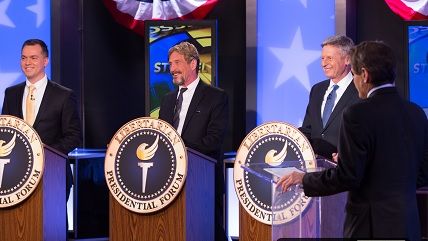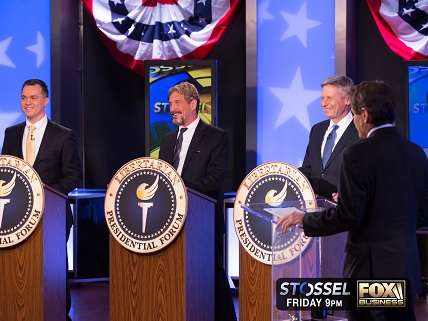Stossel Debate Offers Libertarians a Way to Make Their Ideas Matter
Part two airs tonight on Fox Business.


The second part of a two-hour Libertarian Party presidential debate will air on Stossel on Fox Business tonight at 9:00p.m. ET. The debate, hosted by John Stossel, features 2012 Libertarian presidential candidate and former Republican New Mexico Governor Gary Johnson, software guru John McAfee, and Austin Petersen, who founded LibertarianRepublic.com (I worked alongside Petersen on Fox Business' FreedomWatch with Judge Napolitano from November 2010 until its cancellation in February 2012; see more below). The three finished at the top of a poll commissioned by the Libertarian Party.
Last time around, Johnson scored 1 percent of the vote in the general election, with more than 1.2 million votes, the best showing for a Libertarian presidential candidate since Ed Clark received nearly 1 million votes and north of 1 percent of the vote in 1980. There are at least a dozen candidates running for the Libertarian party altogether, but only Johnson has any prior political experience.
In an election season defined largely by "anti-establishment" feeling and where Donald Trump is the Republican front runner, that's not necessarily as much of a bonus as it might have been previously.Yet Johnson rejected the Republican Party an entire presidential election cycle before it found itself in its current mess, something that ought to earn him some credibility.
Johnson is, to say the least, an imperfect candidate in an imperfect Libertarian field.
Petersen, for example, has been told told by Stossel that he acts like he's 12 years old and Matt Welch has described the candidate as a "hustler." McAfee, meanwhile, was a person of interest in the murder of his neighbor when living in Belize.
And yet the field nonetheless offers something refreshing this election cycle. That's because libertarianism, capital-L or not, isn't about individual politicians but individual liberties.
Libertarians can offer a compelling narrative to an electorate on the verge of facing two major party candidates—Trump and Hillary Clinton—who both have unfavorable ratings north of 50 percent. The unlikeability of the Democratic and Republican nominee could make voters, and maybe even millions of horrified non-voters, more receptive to looking to third parties for articulate ideas and not just cults of personality.
From police and criminal justice reform to education, immigration, and foreign policy, libertarian ideas offer a path outside of often intractable, and always insufferable, partisan scuffles. Trump and Clinton represent the culmination of a years-long atrophy of both parties, fueled by cronyism, an aversion to critical thinking and, above all, an unquestioning belief that government can work given the correct agenda and helmed by the correct people, even as the outcomes tend to expose the ridiculousness of that belief.
So libertarians have a chance this election cycle to make their ideas matter. It's unfortunate that there aren't more high profile Libertarian politicians, but also unsurprising. After all, the ideology is averse to government as a desirable career path. If the candidates focus on educating voters about the ideas behind libertarianism and the role government plays in the social ills driving their fears, rather than triangulating (or incoherently rambling) on issues like gay wedding cakes and Sharia law or creating a cult of personality-like sideshow, perhaps they can be successful in contributing to the momentum of libertarian ideas on the policy and cultural front even absent electoral success.
Disclosure: On a personal note, I considered Austin a friend of mine while we worked together and we kept in touch for some time after that. My main point about his candidacy would be that it's a shame he didn't try to run for something like governor of Missouri first.
You can make a similar point about Johnson, who perhaps could've run for the Senate from New Mexico in 2012, positioning himself better in front of an electorate that, given the popularity of the major party candidates, looks potentially primed for a third party candidate.
More Libertarian campaigns on local and state levels would also work to expose more voters to the idea that government plays a large role in many of the problems it claims to be able to fix. In general, more Libertarians in elected office would be the most direct way to inject policies that limit government into government itself, especially the more that the Republican Party might reject the strain of libertarianism that could be the cure to its terminal statism.


Show Comments (34)